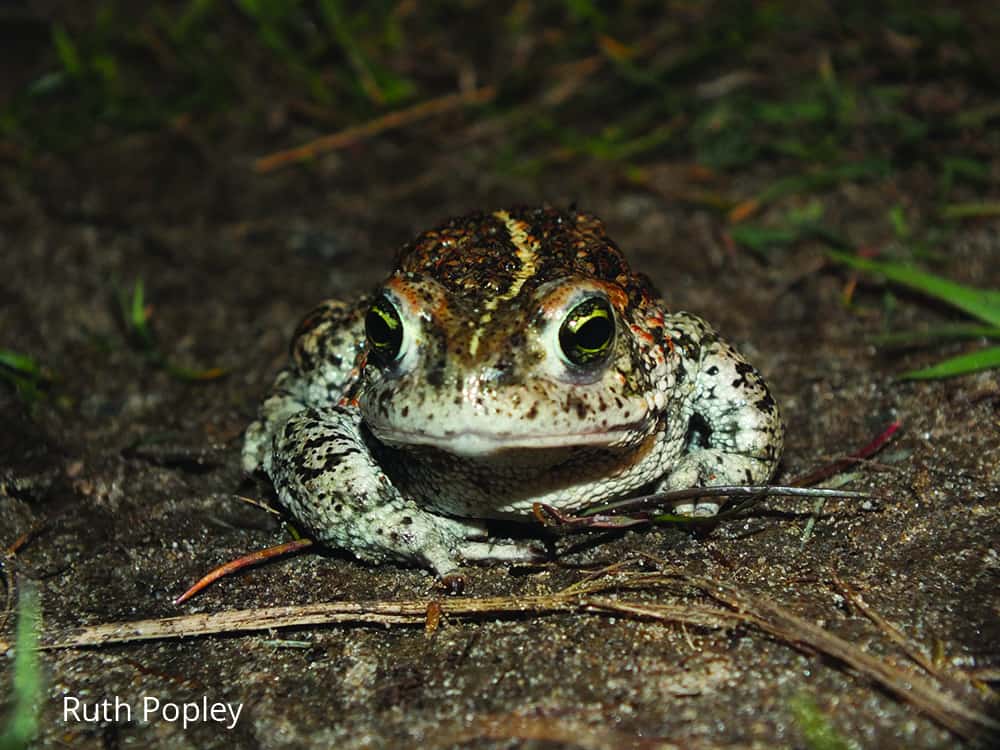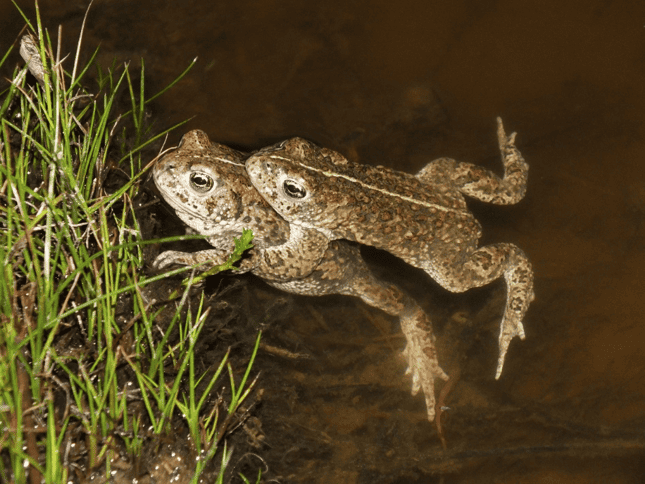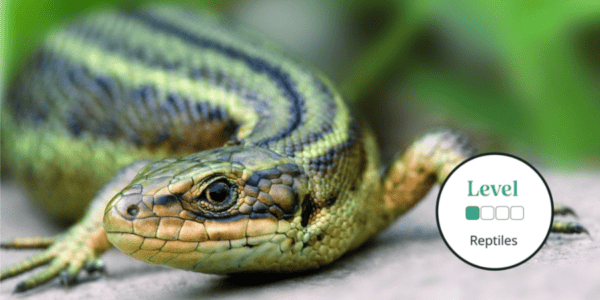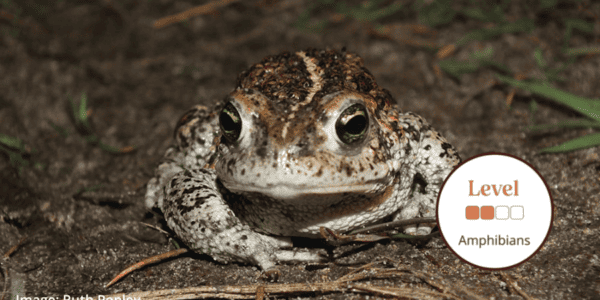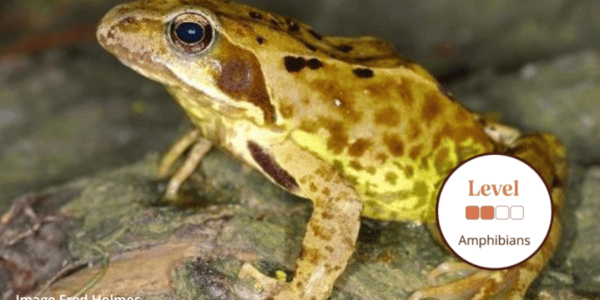This course is now closed. Please view our other Amphibian courses
This Natterjack toad course covers the identification and ecology of this protected species, as well as survey techniques. This course is specifically aimed at environmental consultants, land agents and planners, but anyone with an interest in natterjack toads is welcome to attend.
In Britain, the natterjack toad is almost exclusively confined to coastal sand dune systems, coastal grazing marshes and sandy heaths, though a single colony has been found on an upland fell site in Cumbria.
This beginner course will combine classroom and field learning techniques allowing you to gain confidence in natterjack identification, and an understanding of licensing issues and ecology. We will visit one of the most successful natterjack toad sites in Cumbria to look for natterjack toads at different life stages. If the weather conditions are favourable we would hope to see and hear adult males calling around the breeding pools. We will be visiting ponds at night to count amphibians, so a good torch is essential. This course will give an understanding of the importance of these species for conservation, ecology and recording.
The course has been prepared by two experts in the field of amphibian ecology and conservation, Yvette Martin (UK Amphibian Conservation Officer) and Dorothy Driver (Species Co-ordinator and Great Crested Newt Conservation Officer).
Full attendance on this course counts as 7 hours of Continuing Professional Development.
Your course takes place at Sandscale Haws that is a large dune system with adjacent saltmarsh on the eastern side of the Duddon Estuary in Cumbria. The site, which is managed by the National Trust, forms part of the Duddon Estuary Site of Special Scientific Interest and it is a National Nature Reserve. For more information on the reserve click here
Please note this course is not based at an FSC Centre but will be held at The Dunes Hotel, LA14 4QW. This fee is for tuition only. There are no accommodation, lunch or evening meals provided but arrangements can be made directly with the hotel 01229 461 200 info@the duneshotel.co.uk
Bookings will close if course capacity is reached
Who Should Attend?
Nature enthusiasts, Students, Rangers, Early career consultants and ecologists.
Knowledge Level
Beginner. Level descriptors can be found on the following webpage: Framework and Course Level Descriptors
Prior Knowledge
No existing knowledge or experience is needed for this course. Just a willingness to explore and learn.
What will be covered during this course?
-
- Natterjack identification at all life stages
- Legal and licensing issues
- Natterjack toad ecology
- Survey techniques
- Conservation and habitat management
- Combination of indoor sessions and field visits
By the end of the course, you will be able to:
-
- Confidently identify natterjack toads throughout their lifecycle
- Understand the natterjack toad ecology, legalities and licensing
- Describe and identify different survey techniques for natterjack toads
- Share this knowledge with friends, family, and fellow volunteers.
This is a place-based training course from the Field Studies Council, including a balance of classroom-led learning to impart important knowledge and irreplaceable hands-on outdoor learning opportunities to give individuals skills and confidence. After attending this course, you may like to progress your learning within amphibians with further relevant FSC courses or branch out into other areas of natural history. The Field Studies Council offers both online and in person courses, so you can choose the learning style that suits you best.
The course gives you the opportunity to immerse yourself in a new subject and acquire novel skills. Our fantastic tutors will combine the use of classroom-led learning and outside learning opportunities to give individuals the skills and confidence to learn more about the lives and ecology of natterjack toads.
-
- See the ‘Example Timetable’ and ‘What’s Included’ sections below for more information about this course.
- Upon booking, you will need to provide individual details of all attendees
- Please email [email protected] if you have any questions.
Group Bookings Made Easy
If you have a group of 10 or more individuals wanting to complete one of our courses, our team are available to discuss your options – from discounts to private team courses.
-
- Discounted rates
- Privately run courses for your group
- Bespoke courses developed specifically for your needs
More details can be found here
About our partner, ARC
The Amphibian and Reptile Conservation Trust (ARC) was established in June 2009. ARC was created around the core of the Herpetological Conservation Trust (HCT), in response to the wider needs of herpetofauna conservation, providing the UK focus for all aspects of reptile and amphibian conservation. ARC continues to focus on the UK Biodiversity Action Plan, creating an extensive network of nature reserves, coordinating monitoring programmes and volunteer networks and developing an effective role in advocacy both within the UK and Europe.
Tutor: Yvette Martin
Yvette Martin is the Amphibian Conservation Officer at Amphibian and Reptile Conservation Trust (ARC). Yvette has worked at ARC for almost 7 years and she coordinates the national recovery programme for the natterjack toad. Yvette started working at ARC as part of a knowledge exchange programme in 2015, for 3 years Yvette worked alongside the then Amphibian Conservation Officer John Buckley where she gain valuable insight into the conservation coordination for natterjack toadsTutor: Dorothy Driver
Dorothy is one of Amphibian and Reptile Conservation’s (ARC) species team, in her role as Species Coordinator and Great Crested Newt Conservation Officer. Her role includes policy and advocacy work, training and contributing to the National Amphibian and Reptile Monitoring Programme. Dorothy has worked for ARC (formerly the Herpetological Conservation Trust) since 2004.
Covid Measures
In order to keep our customers and staff safe, we ask that anyone attending our centres:
- Wears a face covering when in shared indoor space (unless exempt).
- Maintains social distancing.
- Cleans their hands regularly.
- Takes a Covid-19 test before they arrive.
Book with Confidence
We understand the difficulties of making plans in the current situation when guidelines continue to change, and insurance conditions are being tightened. In response, we will continue to offer additional flexibility. Find out more here
Example Timetable
Example Timetable
This timetable is subject to change but should give a clear outline of what to expect
-
- Please arrive in time for the course to start promptly at 1:30 pm
- The course will end at 10:30 pm
Hotel information:
The Dunes Hotel
Roanhead Beach
Hawthwaite Lane
South Lakes
Cumbria
LA14 4QW
T: 01229 461 200
E: info@the duneshotel.co.uk
W: www.theduneshotel.co.uk/
| 1:30pm | Meet at The Dunes Hotel in the Champagne Suit for a classroom session covering:
|
| 5:30pm | Dinner - not provided. Can be arranged at the hotel |
| 6:45pm | Travel to Sandscale Haws Nature Reserve for fieldwork (3min car journey, roughly 1mile) |
| 7:00pm | Field session at Sandscape Haws Nature Reserve |
| 10:30pm | Course ends at Nature Reserve |
Please note accommodation and an evening meal is not included but can be arranged directly with The Dunes Hotel
What's Included
The course has been carefully created by expert tutors and educators to help you build your knowledge and apply it within the field surrounded by like-minded individuals.
The course includes:
- Classroom learning covering the theory of the species
- Field excursions to apply new knowledge
- Expert tuition for which the FSC is renowned
- Clear objectives and progression
You can rest assured that the absolute best content from an expert in environmental education will be provided. In choosing a Field Studies Council course, you will be joining thousands of people who learn with us each year.
Before You Attend
What to Bring
- Wellies, waterproofs, clipboard, head torch, paper and pen.
- Biosecurity is an issue so please ensure footwear is clean (mud free!) on arrival.
- A high powered torch, if you have one.
- Warm clothing is advisable!
Accommodation
If you would like to book accommodation, evening meal or refreshments during the day, please arrange this directly with the hotel. As there is no accommodation, meals or refreshments with this course. You are welcome to bring your own drinks and pack lunches if you wish. If booking please mention you are attending the course as the hotel agreed conference rates for our participants, you will also require to arrange a late entrance to the hotel when booking.
The Dunes Hotel
Roanhead Beach
Hawthwaite Lane
South Lakes
Cumbria
LA14 4QW
T: 01229 461 200
E: info@the duneshotel.co.uk
W: www.theduneshotel.co.uk/
How to get to the hotel:
By car - Traveling by car would be the easiest option, follow satnav postcode LA14 4QW
By train - There is a train station in Barrow and plenty of taxis available, however, you will require transport between the hotel and nature reserve locations.
Arriving for your course
How to get to reserve:
Please remember you will be travelling to the reserve from the Hotel, this is a very short journey, you will then leave from here to go home, not going back to the hotel.
By road -Take junction 36 off the M6, then head west on the A590. Drive through Ulverston towards Barrow-in-Furness. After passing Dalton-in-Furness, take Oaklea Road on your right, signposted to Roanhead
By bus - There are no local bus routes but you can catch a bus to Dalton and Barrow-in-Furness. For more information visit Transport Direct or Cumbria Council's bus services
By train - Barrow-in-Furness station (4 ½ miles)
Sorry this course has ended

